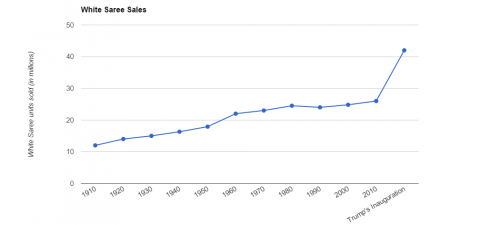
by Rani Shah – Follow @raanstermonster 
Disclaimer: The article below is satire republished from Fuss Class News.
WASHINGTON D.C – The presidency of Donald Trump has spurred on an unconventional trend within the textile industry.
A white saree is commonly worn in the South Asian community during funerals and mourning periods, have seen a marked increase in demand since Friday’s presidential inauguration.
[Read Related: Trump’s Pleasure is Everyone’s Pain: The Immigration Ban, Outrage, and Fear]
The last time white saree sales saw an increase was in the 1950’s due to deaths brought on by polio.

Fuss Class News reached out to the Trump Administration for further comment but did not receive a reply due to their fear of brown people and Sean Spicer’s lack of understanding surrounding basic communication skills.
[Read Related: I’m Finally Admitting That President Donald Trump’s Rhetoric has Gotten To Me]
 Rani Shah is the founder and writer for Fuss Class News, a South Asian satire site. Her hatred of lettuce and appreciation of sprinkles means her friends circle has very interesting dinner parties.
Rani Shah is the founder and writer for Fuss Class News, a South Asian satire site. Her hatred of lettuce and appreciation of sprinkles means her friends circle has very interesting dinner parties.




